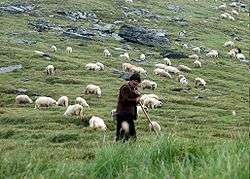pastor
English
Alternative forms
- pastour (obsolete)
Etymology
Borrowed from Old French pastor (Modern French pasteur), from Latin pastor.
Pronunciation
- (Received Pronunciation) IPA(key): /ˈpɑːstə/
- (US) IPA(key): /ˈpæstɚ/
- Rhymes: -ɑːstə(ɹ)
- Rhymes: -æstə(ɹ)
Noun
pastor (plural pastors)
- (now rare) A shepherd; someone who tends to a flock of animals.
- Someone with spiritual authority over a group of people
- A minister or a priest in a Christian church.
- A bird, the rosy starling.
- 1944, Country Life (volume 95, page 820)
- Agricultural officers have put it on record that the pastor must on balance be considered beneficial on account of the vast quantities of locusts which it destroys.
- 1944, Country Life (volume 95, page 820)
Synonyms
- shepherd (in a figurative, religious sense)
Translations
|
|
- The translations below need to be checked and inserted above into the appropriate translation tables, removing any numbers. Numbers do not necessarily match those in definitions. See instructions at Wiktionary:Entry layout#Translations.
Verb
pastor (third-person singular simple present pastors, present participle pastoring, simple past and past participle pastored)
- (Christianity, transitive, intransitive) To serve a congregation as pastor
Catalan
Etymology
From Old Occitan pastor, from Latin pastor, pastōrem.
Latin
Etymology
From pāscō (“to feed, maintain, pasture, graze”), from Proto-Indo-European *peh₂- (“to protect”).
Pronunciation
- (Classical) IPA(key): /ˈpaːs.tor/, [ˈpaːs.tɔr]
Noun
pāstor m (genitive pāstōris); third declension
- A person who tends sheep; shepherd.
- Sextus Propertius, Elegiae; II, i, 43–4
- Navita de ventis, de tauris narrat arator,
Enumerat miles vulnera, pastor oves.- The sailor tells of winds, the ploughman of bulls,
the soldier counts his wounds, the shepherd his sheep.
- The sailor tells of winds, the ploughman of bulls,
- Navita de ventis, de tauris narrat arator,
- Sextus Propertius, Elegiae; II, i, 43–4
- A Christian who takes care of the spiritual needs of other Christians
Inflection
Third declension.
| Case | Singular | Plural |
|---|---|---|
| Nominative | pāstor | pāstōrēs |
| Genitive | pāstōris | pāstōrum |
| Dative | pāstōrī | pāstōribus |
| Accusative | pāstōrem | pāstōrēs |
| Ablative | pāstōre | pāstōribus |
| Vocative | pāstor | pāstōrēs |
Descendants
References
- pastor in Charlton T. Lewis and Charles Short (1879) A Latin Dictionary, Oxford: Clarendon Press
- pastor in Charlton T. Lewis (1891) An Elementary Latin Dictionary, New York: Harper & Brothers
- pastor in Charles du Fresne du Cange’s Glossarium Mediæ et Infimæ Latinitatis (augmented edition, 1883–1887)
- pastor in William Smith, editor (1848) A Dictionary of Greek Biography and Mythology, London: John Murray
Norwegian Bokmål
Norwegian Nynorsk
Old French
Alternative forms
Etymology
Borrowed from Latin pastor, pastōrem. Compare the inherited doublet pastre.
Old Occitan
Etymology
From Latin pastor, pastōrem.
Polish
Portuguese
Pronunciation
- (Portugal) IPA(key): /pɐʃˈtoɾ/
- Hyphenation: pas‧tor
Romanian
Pronunciation
- IPA(key): /ˈpas.tor/
Declension
Related terms
- pastoral
- pastorală
See also
References
- pastor in DEX online - Dicționare ale limbii române (Dictionaries of the Romanian language)
Spanish
Etymology
From Old Spanish pastor, from Latin pastor, through the singular accusative (pastōrem), where the stressed vowel is "o" (in the nominative case, it is "a"), like in Italian pastore.
Pronunciation
- IPA(key): [pa̠sˈto̞ɾ].
Swedish
Pronunciation
audio (file)
Declension
| Declension of pastor | ||||
|---|---|---|---|---|
| Singular | Plural | |||
| Indefinite | Definite | Indefinite | Definite | |
| Nominative | pastor | pastorn | pastorer | pastorerna |
| Genitive | pastors | pastorns | pastorers | pastorernas |
Venetian
Etymology
From Latin pastor, pastōrem. Compare Italian pastore.
